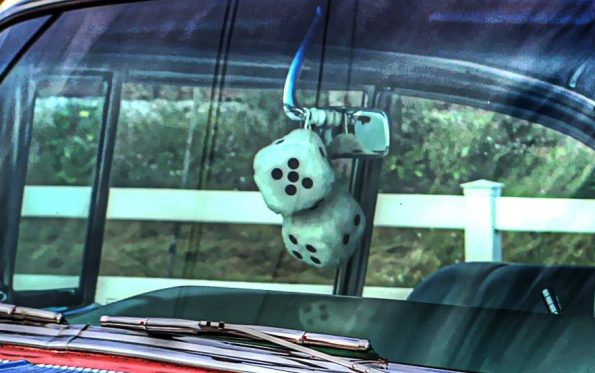You’ve had an accident or your car has been stolen, but your insurance company won’t pay out? Why is this?
Every insurance company has different terms and conditions in the fine print of the contract. Most people don’t read the fine print, so we’re going to give you a simple set of circumstances which will invalidate your car insurance meaning that, effectively, you’re not insured. Not all of these will apply to all insurance companies.
Your car isn’t roadworthy

Sometimes people cut their springs to give this low look on the cheap rather than installing proper air bag suspension
If your tyres are below the minimum tread depth and that contributed to the accident, your insurance company could deny the claim. The same applies to other parts of your car such as your brakes, or if you have an obviously defective handbrake and your car rolls into a lake. It also applies to illegal modifications like chopped springs.
Insurance companies could require your car to be legal, i.e. registered.
You’re driving outside the conditions of your licence
For example, if you have your Ls and you’re not driving with a supervisor, or if you’re driving a vehicle over 3500kg without a heavy vehicle licence, you’re not insured.
If your licence has expired, you will not be insured.
You’re not a named driver
You’re simply not insured to drive the vehicle because the owner doesn’t have you as a named driver. Or, you might have a powerful vehicle and you let someone else drive it who is not named on the policy. This is a common restriction for expensive, high-powered vehicles.
You haven’t been truthful when disclosing information to your insurance company
You insurance company takes a bunch of parameters about where you live, how many previous claims you’ve had, what kind of vehicle you’ve got, where you park it, how many kilometres you do a year, how long you’ve had your licence, whether you’re male or female, etc, and calculates a level of risk in order to provide you an insurance premium that reflects that risk. If you lie about any of this information or your circumstances change (e.g. you go from having a car that’s garaged off-road to one that’s parked on the street overnight) this could affect your risk profile. If you don’t let your insurance company know, they could deny a claim if the change contributed to the loss.
You haven’t declared any modifications

This is probably making a few more horses than when it was first built
Modifications are usually defined as changes to the vehicle that aren’t available as options from the manufacturer. For example, adding a turbo to a non-turbo engine is a modification, whereas adding factory-fitted optional nudge bars is not a modification, it’s an accessory. Some non-factory additions are considered accessories if they don’t affect the performance, such as tow bars and roof racks. Modifications are usually considered to carry more risk if they increase the power or speed of the vehicle.
You will also want to declare the value of any modifications so that the insurance company will pay out for them if they enhance the value of your car – i.e. if you don’t declare them you might be under-insured and not get enough money to replace your vehicle. This applies to things like aftermarket alloy wheels/mags, which might be worth quite a lot.
You didn’t renew your insurance
If your insurance isn’t current, you’re not insured, even if it just expired yesterday. To keep your insurance current, pay it automatically.
You have a medical condition
If you have a medical condition and have been told by a doctor not to drive, or you have been forbidden to drive, you won’t be insured when driving. Some conditions do not necessarily prevent you from driving but you would need to notify the insurance company before you do. Some examples are listed here, such as blackouts, stroke, epilepsy and diabetes.
You’re breaking the law
If you crash while drunk or under the influence of illegal drugs, it’s likely the insurance company won’t pay out. If you crash while under the influence of prescription drugs (medication) when a doctor has told you not to drive, your insurance company might not pay out.
If you are using excessive speed, using a mobile phone, racing someone on the road, drifting or doing burnouts, this could invalidate your policy.
Inappropriate footwear or clothing

Driving in these probably isn’t that easy.
Wearing thongs and other unstable footwear like extreme platform shoes while driving is dangerous and causes extra risk. An insurance company could refuse your claim if it was a contributing factor.
Racing tracks (even for educational purposes)
Using your car for a track day, controlled testing or a race is a definite no-no, but what about if there’s a driver education event? Let your insurance company know. If it is low-speed and designed to improve general driving skill such as manoeuvring and hazard awareness, this might be OK; generally, performance driving courses will invalidate the insurance policy.
Pets

A pet that isn’t in a harness could get in amongst the pedals, distract you or jump about and obstruct your view
If an unrestrained pet in the car causes a distraction or prevents you from operating your car and you have an accident, this might invalidate your policy.
Visual obstructions

If there’s something in your windscreen that blocks your vision, remove it
Things that may make it difficult to maintain your insurance if they are found to contribute to or cause an accident are hanging a pair of fluffy dice from your rear-view mirror that obstructs your view, installing tinted windows that aren’t within legal guidelines, driving with stickers on your windows, etc.
You left it unlocked with the keys in it
You must keep your car secure. If you leave it running while you dash into a shop, or unlocked with the keys in it, that’s negligence.
